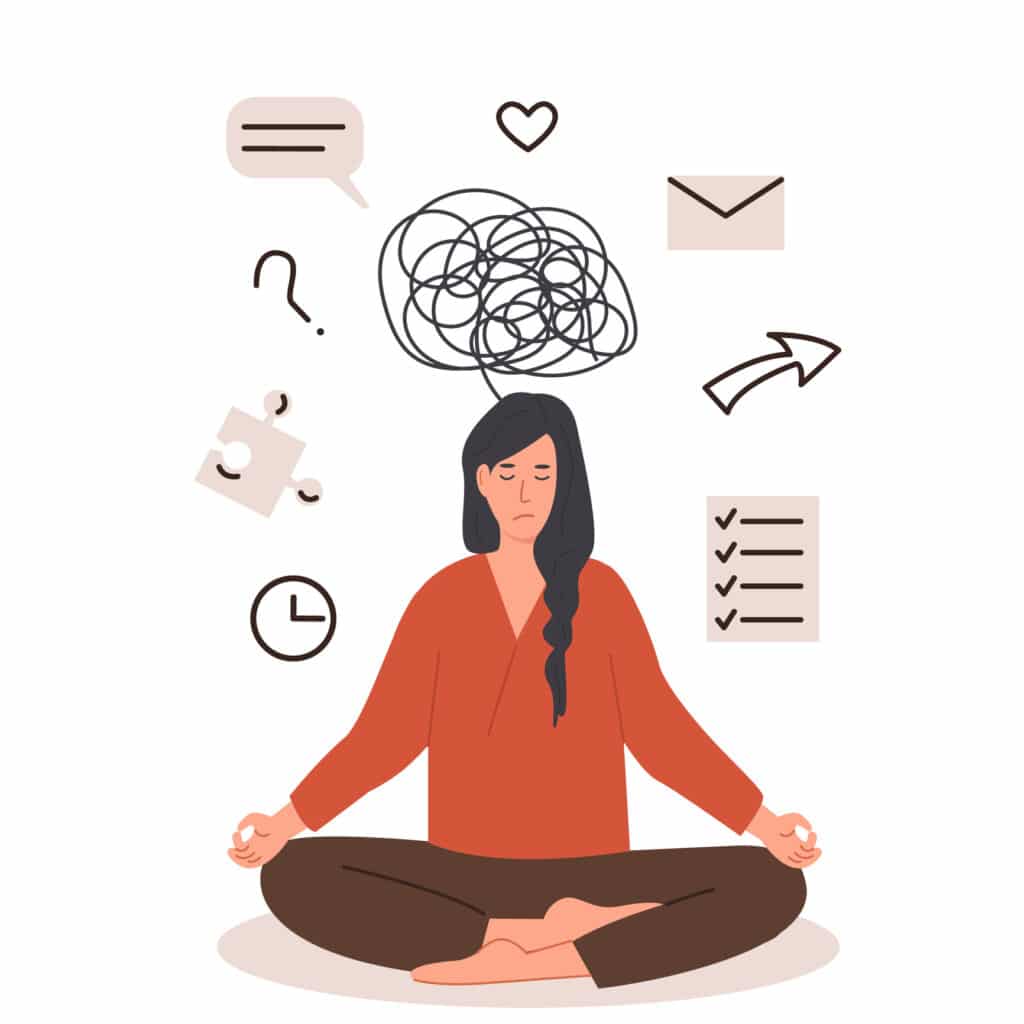
By Michelle Seitzer
There’s so much more to ADHD than a struggle to sit still or pay attention. Just as each human being is unique, so are the ways each human being with ADHD experiences the disorder in their brain and body. And while you can read countless articles from medical professionals about the symptoms, nobody describes it better than the individuals living with it.
Here’s how five people from across the age spectrum — and working in a variety of professional settings — answered the question: “What does ADHD feel like?”
Ryan Mayer, ADHD Coach, Ryan Mayer Coaching:
What ADHD feels like in the brain: “You always feel like you’re doing something that will get you in trouble. Think back to when you were a kid, maybe 7 to 10 years old. Your parents just caught you doing something you knew you weren’t supposed to be doing. The feeling that shot through your body the moment you heard them call your full name — including middle name? Yeah, it’s that feeling. Except when you have ADHD, that feeling lasts the whole day.
You do things that feel good, even when you know you’ll regret it later.
Imagine you’re starving — you haven’t eaten all day. Fortunately, the large pepperoni pizza you just ordered for delivery from your favorite hometown spot is about to arrive. Just minutes after you open the box, you’ve already eaten more than enough to be full. But there’s one piece left … just staring at you. You think: ‘Mmm, I probably shouldn’t. Last time I did that, I was kicking myself for days. And I’ve been trying to lose that weight…’ But a seemingly unstoppable force moves your hand, grabs the pizza, and shoves it into your mouth. ADHD tells you: ‘Just one more’ — every time. Even though you know it isn’t OK.”
What ADHD feels like in the body: “You move frustratingly slow, no matter how hard you try.
Imagine someone has challenged you to run on a treadmill. You accept the challenge, as this person is always trying to put you down. They then blindfold you. While this frustrates you and makes you feel a bit disoriented, you’re determined to prove you can do this. They then inform you the entire experiment will be taking place underwater. While this seems completely illogical, you’re assured: ‘This is how we’ve always done it,’ and ‘Everyone else is able to do it this way. You’re just going to have to figure out how to make it work…’
Trying to run on a treadmill, underwater, while blindfolded. That’s what it feels like inside the body of a person with ADHD.
The punchline? You rip off your blindfold and look around, only to realize everyone else is running full speed on their underwater treadmills, with no problem whatsoever.”
Shelah Barr, Certified Expert in Canine Massage and Fitness Training, Happy Hounds Massage:
“I was diagnosed two years ago at age 62 as ‘severely impaired’ with ADHD, primarily inattentive with hyperactive features.
It feels very busy and colorful here (in my brain). There are always uncountable thoughts, images and feelings happening at once, almost like being in a fun house. But it can be a constant swervy, jerky, overwhelming ride through a fun house of all the things that have happened, are happening and may happen in my life. So — not so fun all the time, but there are a lot of creative thoughts and problem-solving too.
Physically, I feel like there’s a little motor in all of my body parts that just keeps things moving even though I don’t want them to. It feels almost like a constant buzzing, and like little wind-up toys are living inside me, but they don’t need to be wound up. They’re solar powered!
When they diagnose you with ‘inattentive’ ADHD, a more accurate description would be too much attention on internal and external stimuli. I find it nearly impossible to filter out things that are happening in my environment and what’s going on in my head.
It’s a huge challenge for me not to get distracted by a thought or something that comes into my field of vision or hearing. I’m compelled to pay attention to that thing, and frequently respond to it either verbally or physically.
I feel like I think more quickly than most people, and I’ve heard this from other people who have ADHD. In spite of all the chaos that’s going on in my head, there are some excellent problem solutions, ideas for businesses, creative answers for political and social issues and so on. Plus I can easily entertain myself with rabbit holes; I think all the random facts stored in my brain are hilarious.
Also, as is common with ADHD, I’m a very out-of-the-box thinker. I actually don’t even know where the box is. This has given me advantages that other people don’t have, and I feel very lucky to be able to see things and create what other people can’t even imagine.”
Becky Morrison, Mental Health Nurse Practitioner, Author, Columnist:
“Ever since I could remember, I always felt different. I looked like all the other girls, but I thought differently, acted differently and talked differently. There was and still is this powerful engine inside of me that drives all that I do and all that I am and I cannot turn it off no matter what I do.
Imagine every day you wake up, you have this engine inside you, racing to go all the time and if you don’t drive that engine, you feel like you are going to blow into a thousand pieces.
Imagine that you cannot stop the words from coming out of your mouth in any situation with any person. You know it’s rude, you know it’s not your turn to speak but you literally cannot wait because that engine was raring to go again. It didn’t matter the context or the persons involved, I had to speak, interrupt people and get those words out of my mouth. If not, there was this very uncomfortable feeling that grew and grew until I let that engine do what it wanted and then — ‘ahhh, relief, sweet relief’ — even for just a little bit.”
Jacquelyn Dupras, Certified ADHD Life Coach
“What does ADHD feel like in the brain and body? I remember long ago thinking it was like treading water for hours on end. I wanted to get out of the riptide, but I was exhausted from treading water, and the current was not allowing me to reach the shore.
Wave after wave, crashing on me, not allowing me to get a full breath in before another wave came crashing on me. The next thing I know, I’d find myself washed up on shore. Beat up and exhausted, but alive. It will now take days, possibly weeks, to recover from something that seems so easy for the neurotypical.
I am now an ADHD life coach; my life seriously changed directions after I found out I had ADHD. I could finally put all those puzzle pieces together.
I decided to dive into learning all I could about ADHD, so I enrolled in ADDCA (the ADD Coach Academy), one of the top schools in the world for ADHD education. I enrolled to not only help myself, but with a hope to possibly help other people not go through what I had gone through.”
Miranda D. Prosniewski, Vintage Shop Owner:
“I was officially tested and diagnosed at 28 with ADHD inattentive type. I suspected I had inattentive ADHD since I was a child. My report card always stated ‘Miranda daydreams.’ I could read entire book chapters and have no recollection of what I had read when quizzed. I also lost things all the time, or forgot to bring materials to class that we used all the time — like pencils.
When you have ADHD you feel like there are all these cool, fun activities/things to learn and read, but you want to do them all at once. There’s no such thing as one thing at a time. I attribute that to our poor short-term memories. Like we are going to forget about that one thing that interested us and we will never recall what it was and therefore never get to do it.
We have a hard time planning for the future, as everything that matters to us is right here, right now. We are not deficit in attention; we pay too much attention to every little thing all the time. So our attention span is spread so thin over many different things at once.
If there is a task on our to-do list that is boring, or we are not engaged, it is physically painful to complete. Unless we get a rush of endorphins as we complete something last minute. When trying to complete said task, we feel like we are walking through mud.
Often we have developed coping mechanisms tailored to us. Like for studying or remembering important details. Adults will write incredibly long to-do lists. We will be obsessed with paper agendas and electronic calendars — like when we find the right one, our lives will fall into place. Unfortunately, we forget to check our calendars on a regular basis.
That being said, I would not ever give up ADHD. I can dream up the most creative solutions to complex problems. I am constantly thinking outside the box, which has served me well. And I lead, not follow.”





